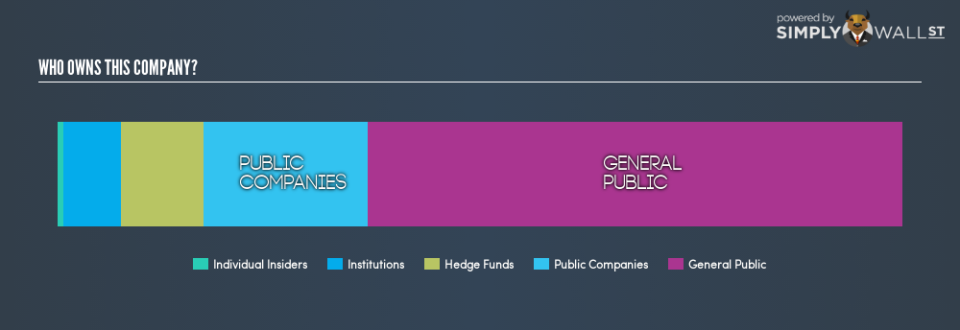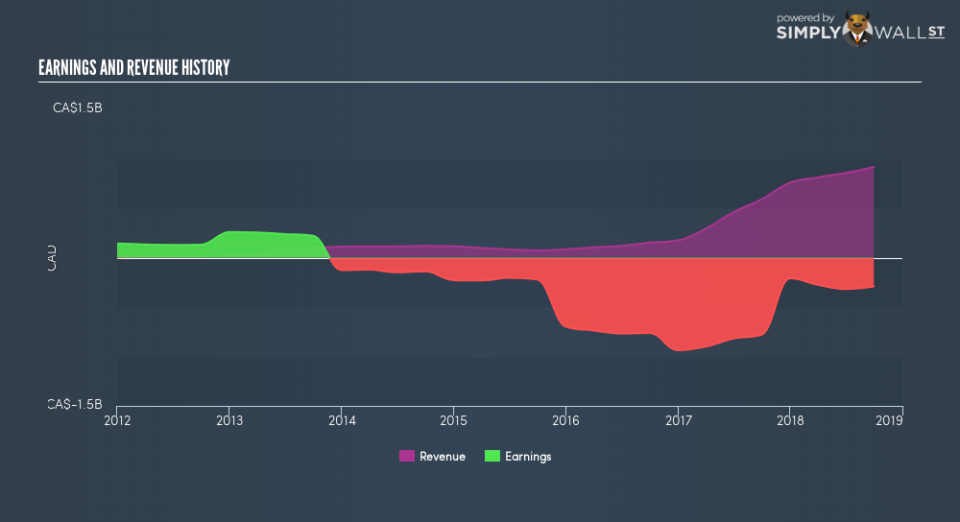Do Institutions Own Athabasca Oil Corporation (TSE:ATH) Shares?

A look at the shareholders of Athabasca Oil Corporation (TSE:ATH) can tell us which group is most powerful. Insiders often own a large chunk of younger, smaller, companies while huge companies tend to have institutions as shareholders. We also tend to see lower insider ownership in companies that were previously publicly owned.
With a market capitalization of CA$459m, Athabasca Oil is a small cap stock, so it might not be well known by many institutional investors. Taking a look at the our data on the ownership groups (below), it’s seems that institutions own shares in the company. Let’s take a closer look to see what the different types of shareholder can tell us about ATH.
View our latest analysis for Athabasca Oil
What Does The Institutional Ownership Tell Us About Athabasca Oil?
Institutional investors commonly compare their own returns to the returns of a commonly followed index. So they generally do consider buying larger companies that are included in the relevant benchmark index.
As you can see, institutional investors own 6.8% of Athabasca Oil. This suggests some credibility amongst professional investors. But we can’t rely on that fact alone, since institutions make bad investments sometimes, just like everyone does. It is not uncommon to see a big share price drop if two large institutional investors try to sell out of a stock at the same time. So it is worth checking the past earnings trajectory of Athabasca Oil, (below). Of course, keep in mind that there are other factors to consider, too.
Our data indicates that hedge funds own 9.8% of Athabasca Oil. That catches my attention because hedge funds sometimes try to influence management, or bring about changes that will create near term value for shareholders. Quite a few analysts cover the stock, so you could look into forecast growth quite easily.
Insider Ownership Of Athabasca Oil
The definition of company insiders can be subjective, and does vary between jurisdictions. Our data reflects individual insiders, capturing board members at the very least. Management ultimately answers to the board. However, it is not uncommon for managers to be executive board members, especially if they are a founder or the CEO.
Most consider insider ownership a positive because it can indicate the board is well aligned with other shareholders. However, on some occasions too much power is concentrated within this group.
Our information suggests that Athabasca Oil Corporation insiders own under 1% of the company. It has a market capitalization of just CA$459m, and the board has only CA$3.7m worth of shares in their own names. Many investors in smaller companies prefer to see the board more heavily invested. You can click here to see if those insiders have been buying or selling.
General Public Ownership
The general public, who are mostly retail investors, collectively hold 63% of Athabasca Oil shares. This level of ownership gives retail investors the power to sway key policy decisions such as board composition, executive compensation, and the dividend payout ratio.
Public Company Ownership
Public companies currently own 19% of ATH stock. We can’t be certain, but this is quite possible this is a strategic stake. The businesses may be similar, or work together.
Next Steps:
While it is well worth considering the different groups that own a company, there are other factors that are even more important.
I like to dive deeper into how a company has performed in the past. You can find historic revenue and earnings in this detailed graph.
If you are like me, you may want to think about whether this company will grow or shrink. Luckily, you can check this free report showing analyst forecasts for its future.
NB: Figures in this article are calculated using data from the last twelve months, which refer to the 12-month period ending on the last date of the month the financial statement is dated. This may not be consistent with full year annual report figures.
To help readers see past the short term volatility of the financial market, we aim to bring you a long-term focused research analysis purely driven by fundamental data. Note that our analysis does not factor in the latest price-sensitive company announcements.
The author is an independent contributor and at the time of publication had no position in the stocks mentioned. For errors that warrant correction please contact the editor at editorial-team@simplywallst.com.

 Yahoo Finance
Yahoo Finance 

